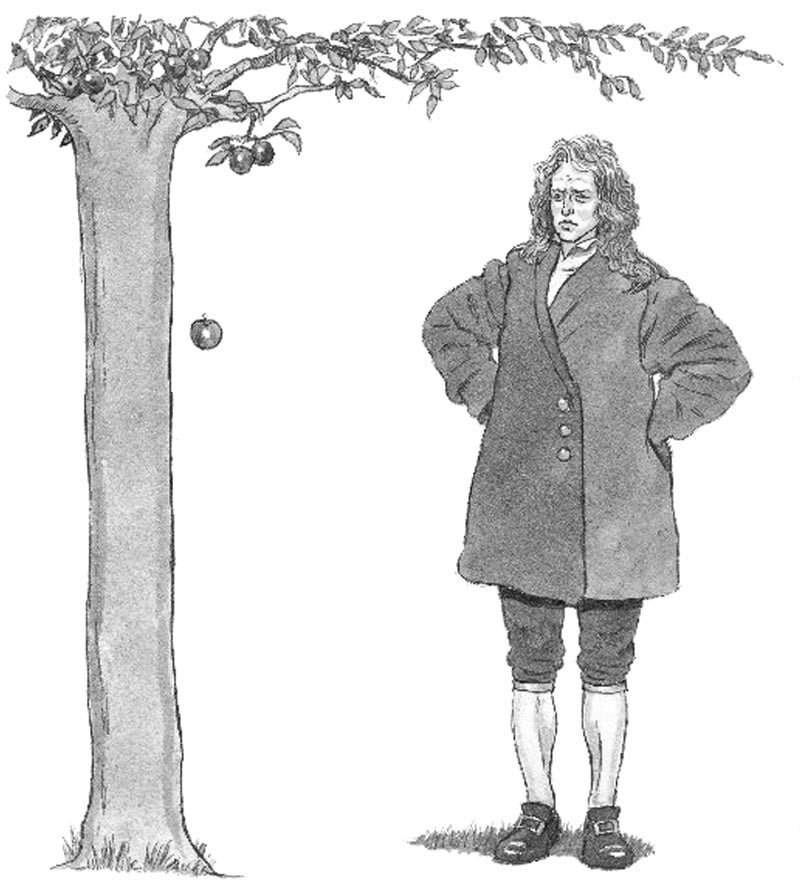A famous anecdote or story about Isaac Newton is that one day he sat in the botanical garden of Cambridge University under an apple tree contemplating over the mysteries of nature when an apple fell down from the tree to land in front of him or on his head. It surprised Newton. His thinking mind asked questions. Why should the apple fall down to the earth and not go upwards to the sky after delinking from its branch?

It is claimed that this apple falling incident led to Newton analyse the cause and discover the Law of Gravity. This myth had an anecdotal charm and that made it famous all over the world and an oft quoted story. But it does not look likely that it may have actually happened. Newton has made no such mention in any of his research papers or book. But to lend credence to the story it can be claimed authentically that there indeed existed an apple tree in the botanical garden of the Cambridge University. It is possible that some of the biographers of Newton may have visualized the incident and connected it to the tale of discovery of gravitational law. Or one of them could have been told the apple story by some friend or associate of Newton.
Whatever may be the truth, the fact is that world over the law of gravity is seen with the falling apple in the ‘thereby hangs a tale’ way. Even before Newton apples had fallen on the heads of numerous people but unfortunately without hammering the law of gravity idea into the grey matter inside. The story may be symbolic as well. Millions of academics had seen nature’s laws at work but the idea of defining those laws flashed only into the mind of Newton. This flashing of the revolutionary idea was interpreted as apple falling tale for analogous presentation. Whoever invented that story deserves some credit of being imaginative and a round of applause with apple-sauce.
In this context there does exist an actual mention of the apple incident in a biography of Newton written by John Conduit a Royal Mint colleague and the husband of his neice. He wrote:
‘In 1666 Isaac Newton had come to Lincolnshire to his mother on vacation from Cambridge. (Then apple incident had already happened). While taking a stroll Newton used to mull over the fact that the apple that had fallen was not at much height. But gravitational force of earth worked at greater height too. He also used to wonder to what height the gravitation worked its pull? Why does it not work to the height of moon? Thus, Newton used to amble talking to himself and posing questions and thinking of answers like the earth rotates in its orbit, so does moon…that means both have gravitational power effective only up to their orbital distance. So Newton used to walk his thought, questions and probable answers. At that stage there was no doubt about the existence of the gravitational power but the question was that of its reach or the range of its effectiveness. His power of imagination had led him to believe that the moon had its own gravitational power like the earth had and that enabled it to orbit around the earth. Newton reached at the conclusion that if the gravitational power of moon was determined then its orbital rotation could be correctly timed. Newton was certain that all the bodies in the space had their own gravitational power like the earth had. Isaac Newton called it ‘Cosmic Gravitational Power’.
In April 1, 1726 a thinking writer named William Stuckley wrote a book based on an interview with Newton at Kensington titled Memories of Sir Isaac Newton. He reported his interview, as revealed by Newton, a part of which is as follows—
When earlier Newton got the idea from a tree an allied question also came to his mind that why the apple fell at 900 angle? Why it did not take swaying path or at some other angle and why shortest perpendicular line? When the apple gets freed of the inertia of being linked to the branch why doesn’t it go skywards?
In the same context Voltaire had expressed in verse form his reaction in 1727 according to which he saw an apple falling from a tree which gave him the first idea of gravitational power. If these myths are merely exaggerations then he may have seen an apple falling from the window of his Woolsthorpe Manor and speculated over a force called gravitation.

